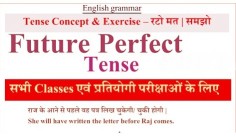पहचान – जो कार्य भविष्य में खत्म हो चुका होगा वह Future Perfect Tense के अंतर्गत आता है । ऐसे वाक्यों के अंत में चुकूंगा , चूकेंगे , चुकेगा , चुकोगे , चुका रहेगा , चुकी रहेगी शब्द आते है ।
Formulae–
Subjects I और we के साथ shall have और अन्य subjects (He,She, It,They ,name etc ) के साथ will have लगाते हैं ।
- +ve – Sub +shall/will+ have +V3 + obj .
- -ve – Sub + shall/will + not + have + V3 obj .
- Sub + shan’t/won’t + have +V3+obj .
- Ques – Shall/will +sub + have +V3 +obj ?
- Shall/will + sub + not + have +V3+obj ?
- Shan’t/won’t +sub + have +V3 +obj ?
A. Affirmative Sentences
1. मैं यह काम कर चुका होऊंगा
I shall have done this work .
2. सूरज छिपने से पहले हम घर पहुंच चुके होंगे
We shall have reached home before the sun sets .
3. आपके आने से पहले मैं खा चुकी रहूंगी
I shall have eaten before you come.
4. उन्होंने यह काम उस समय तक पूरा कर लिया होगा
He will have completed the work by that time .
5. शिक्षक ने परीक्षा से पहले पाठ्यक्रम समाप्त कर दिया होगा
The teacher will have finished the course before the exam .
6. मैं पत्र लिख चुकूंगा
I shall have written a letter .
7. शिक्षक पढ़ा चूकेंगे
The teacher will have taught .
8. लड़के जा चुके होंगे
The boys will have gone .
Rule 1. अगर एक वाक्य में दो कामों का होना पाया जाए तो पहले होने वाले काम को Future Perfect Tense और बाद में होने वाले काम को Simple Present Tense में बनाते हैं । e.g. ( 2, 3 )
Rule 2.Subjects I और we के साथ shall have और अन्य subjects (He,She, It,They ,name etc ) के साथ will have लगाते हैं । और Third Form of Verb का प्रयोग करते है ।
B. Negative Sentences
- 1. वर्षा होने से पहले वह अपना काम समाप्त नहीं कर चुका होगा ।
He will not have finished his work before it rains . - 2. गाड़ी के आने से पहले हम टिकट नहीं ले चुके होंगे ।
We shall not have taken a ticket before the train arrives . - 3. मेहमानों के आने से पहले हम खाना नहीं खा चुकेहोंगे ।
We shall not have eaten food before the guests arrive . - 4. वर्षा होने से पहले अनु घर नहीं जा चुकी होगी ।
Anu will not have gone home before it rains . - 5. उन्होंने कार नहीं खरीदी होगी ।
They will not have bought a car . - 6. सोने से पहले बच्चे ने दूध नहीं पिया होगा ।
The child will not have drunk milk before he sleeps . - 7. परीक्षा शुरू होने से पहले मैं अपना पाठ याद नहीं कर चुका हुंगा ।
I shall not have learnt my lesson before the exam starts. - Rule 1. Negative sentences में will / shall के बाद not लगाते है । फिर Have , फिर Third Form of verb लगाते है ।
C. Interrogative Sentences
- 1. क्या वर्षा होने से पहले अनु घर नहीं जा चुकी होगी ?
Will Anu not have gone home before it rains ? Or Won’t Anu have gone home before it rains ? - 2. क्या गाड़ी के आने से पहले हम टिकट ले चुके होंगे ?
Shall we have taken a ticket before the train arrives ? - 3. कल तक सभी विद्यालय क्यों बंद हो चुकेगे ?
Why will all the schools have closed by tomorrow ? - 4. वह शाम तक क्यों लौट चुकेगा ?
Why will he have come back by the evening ? - 5. मेरे आने से पहले कितने लड़के यहां आ चुके होंगे ?
How many boys will have come here before I come ? - 6. मेरे आने के पहले कौन चॉकलेट खा चुका होगा ? W
ho will have eaten chocolate before I come ?
Rule 1. Interrogative negative sentences में ‘ not ‘ subject के बाद आता है । लेकिन अगर ‘ not ‘ auxiliary verb के साथ contracted हो (i.e. won’t / shan’t ) तो Contraction ( won’t / shan’t) Subject के पहले आता है । e.g. ( 1 )
Rule 2. Interrogative sentences में अगर वाक्य के शुरुआत में ‘ क्या ‘ हो तो will / shall subject से पहले लगाते हैं और verb की Third Form लगाते है । वाक्य में सबसे पहले ‘ क्या ‘ हो तो ‘क्या ‘ के लिए what नहीं लगाते हैं । e.g. ( 1, 2 )
Rule 3. अगर प्रश्न सूचक शब्द वाक्य के बीच में हो तो अनुवाद करते समय सबसे पहले उनकी अंग्रेजी आती है , फिर will / shall आता है फिर subject और फिर have , फिर verb की Third Form आती हैं । Rule 4. How many , how much, whose , which के साथ उनसे संबंधित nouns भी आते हैं । e.g. ( 5 )
Rule 5.वाक्य के अंत में प्रश्नसूचक चिन्ह (?)अवश्य लगाते हैं ।
Future Perfect Tense के प्रयोग – (Usage of Future Perfect Tense)
1. जो कार्य भविष्य में किसी निश्चित समय पर पूरा होगा की अभिव्यक्ति के लिए वह शाम तक लौट चुका होगा ? He will have come back by the evening ?
2. भविष्य काल में किसी कल्पना (imagination)को व्यक्त करने के लिए तुमने महात्मा गांधी का नाम सुना होगा । You will have heard the name of Mahatma Gandhi . वह अपने स्कूल में प्रथम पुरस्कार पाई होगी । She will have got first prize in her school .
